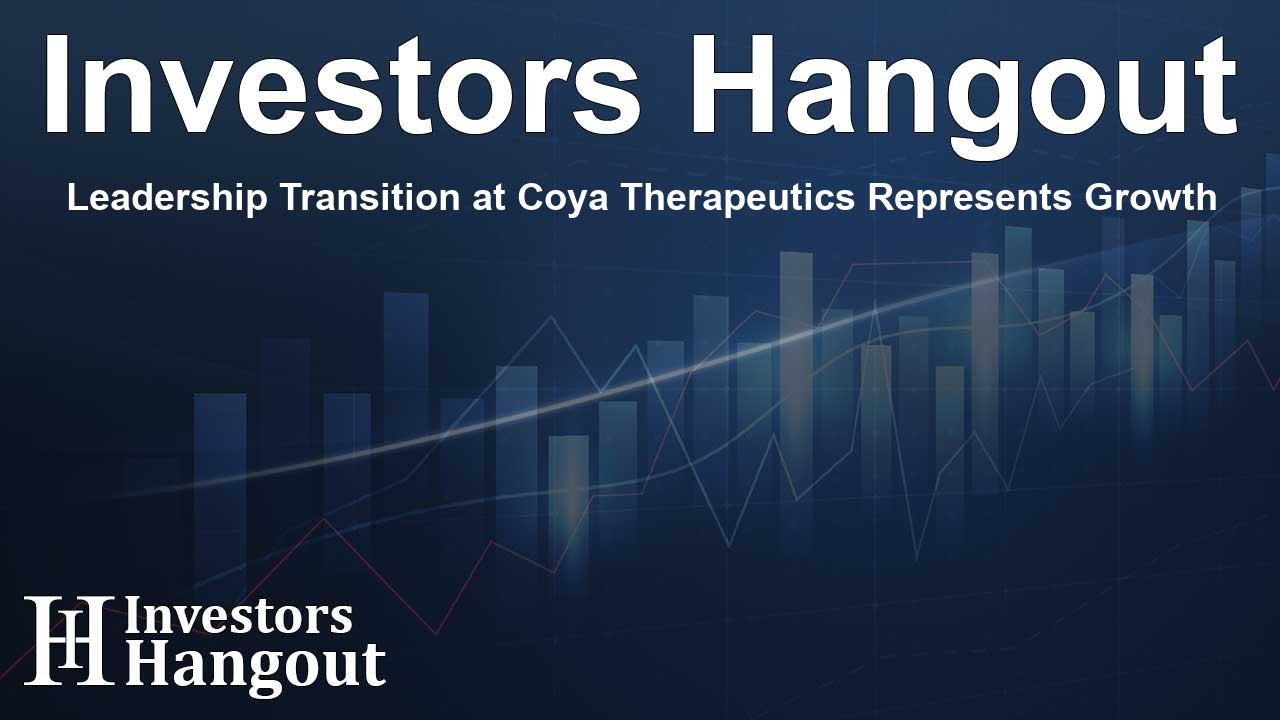Leadership Transition at Coya Therapeutics Represents Growth

Coya Therapeutics Announces New CEO
Coya Therapeutics, Inc. (NASDAQ: COYA), a pioneering biotech company focused on enhancing regulatory T cell function, has appointed Arun Swaminathan, Ph.D., as the new Chief Executive Officer. This promotion marks a significant step for Coya as it navigates through a critical growth phase, steering towards advancements expected to bolster its treatment efforts for debilitating neurological diseases.
Dr. Swaminathan’s Vision for Coya
Dr. Swaminathan is well-regarded for his deep knowledge in strategic operations and significant commercial transactions. Notably, he played a role in a potential collaboration valued at around $700 million with Dr. Reddy's Laboratory. Under his guidance, Coya is set to accelerate its development of therapeutic solutions for serious neurodegenerative conditions like ALS, Alzheimer’s disease, Frontotemporal Dementia, and Parkinson’s disease.
Promising Trial Results
The company recently showcased encouraging Phase 2 clinical trial findings regarding their treatment protocols targeting Alzheimer’s disease. These trials involved administering low-dose interleukin-2 (LD IL-2) to patients with mild to moderate symptoms, resulting in notable improvements in cognitive function and biomarkers linked to regulatory T cell efficacy. This advancement in therapy underlines the effectiveness of lower IL-2 dosages in stabilizing cognitive health.
Innovative Product Pipeline
Coya is diligently working on investigational products like COYA 301 and COYA 302. These products aim to enhance the immune system's regulatory T cell functionality while mitigating inflammation caused by activated immune cells. Coya 302, which combines LD IL-2 with CTLA4-Ig, is particularly promising and is being developed for subcutaneous delivery to treat multiple neurodegenerative diseases.
Recent Clinical Study Findings
Earlier reports indicated that a clinical study conducted at the Houston Methodist Research Institute revealed that the combination therapy of LD IL-2 and CTLA4-Ig was well-tolerated among ALS patients over a substantial 48-week period. Patients exhibited slowed disease progression as assessed by the ALSFRS-R scale, strengthening the foundation for Coya’s treatment approaches.
The Broader Impact of Coya’s Research
The ongoing work at Coya Therapeutics aims to combat the severe implications of neurodegenerative diseases impacting the lives of many. It’s crucial to understand that products like COYA 301 and COYA 302 remain investigational and await regulatory approval—both are part of the company’s commitment to advancing this vital field of medicine.
Strategic Financial Developments
Coya recently secured a significant private placement worth roughly $10 million, predominantly involving its current institutional investors. These funds are directed towards propelling the company’s pipeline and addressing operational needs as it continues to push its innovative treatments forward.
Regulatory Challenges and Collaborations
Despite the positive strides, Coya faced minor regulatory obstacles from the FDA regarding additional data for its ALS investigational drug, which has postponed the initiation of a Phase 2 trial. Nevertheless, Coya remains undeterred, reinforcing its collaboration with the Houston Methodist Research Institute to enhance its proprietary Treg exosome technology.
Financial Insights and Market Performance
Under Dr. Swaminathan's stewardship, Coya Therapeutics approaches a pivotal moment. Recent financial data indicates that while the company is currently not profitable, insights reveal a stronger balance sheet with more cash than debt. This implies flexibility and an ability to navigate the challenging biotech landscape, especially as it engages in costly neurodegenerative research.
Stock Performance and Future Outlook
Despite recent challenges causing a -19.31% return in stock value over the last week, Coya Therapeutics has shown remarkable resilience with a 55.82% return in the past year. Such fluctuations are common in the biotech domain, particularly for firms still developing their market-ready products.
Frequently Asked Questions
Who is the new CEO of Coya Therapeutics?
Arun Swaminathan, Ph.D., has been appointed as the new CEO of Coya Therapeutics.
What diseases does Coya Therapeutics focus on?
Coya Therapeutics is dedicated to developing treatments for neurodegenerative diseases, notably ALS, Alzheimer’s disease, Frontotemporal Dementia, and Parkinson’s disease.
What recent trial results did Coya Therapeutics report?
Recent trials indicated that low-dose interleukin-2 showed cognitive stabilization in patients with mild to moderate Alzheimer's disease.
What are COYA 301 and COYA 302?
COYA 301 and COYA 302 are investigational products aimed at enhancing regulatory T cell function and suppressing inflammation in neurodegenerative diseases.
Does Coya have any regulatory setbacks?
Coya faced regulatory challenges with the FDA requiring additional data for its ALS investigational drug, delaying further trials but continues to focus on its innovative therapeutic development.
About Investors Hangout
Investors Hangout is a leading online stock forum for financial discussion and learning, offering a wide range of free tools and resources. It draws in traders of all levels, who exchange market knowledge, investigate trading tactics, and keep an eye on industry developments in real time. Featuring financial articles, stock message boards, quotes, charts, company profiles, and live news updates. Through cooperative learning and a wealth of informational resources, it helps users from novices creating their first portfolios to experts honing their techniques. Join Investors Hangout today: https://investorshangout.com/
Disclaimer: The content of this article is solely for general informational purposes only; it does not represent legal, financial, or investment advice. Investors Hangout does not offer financial advice; the author is not a licensed financial advisor. Consult a qualified advisor before making any financial or investment decisions based on this article. The author's interpretation of publicly available data shapes the opinions presented here; as a result, they should not be taken as advice to purchase, sell, or hold any securities mentioned or any other investments. The author does not guarantee the accuracy, completeness, or timeliness of any material, providing it "as is." Information and market conditions may change; past performance is not indicative of future outcomes. If any of the material offered here is inaccurate, please contact us for corrections.









